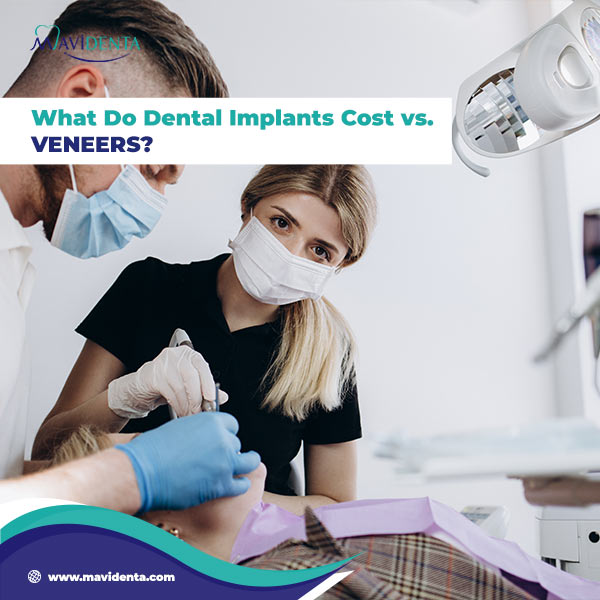A confident smile lights up a room, but chipped, cracked, or missing teeth can hold you back. Dental implants and veneers are potent tools in a cosmetic dentist’s toolbox, but they differ in approach and price. This article discloses the considerations for dental implants vs veneers cost, cost empowering you to make the best choice for your budget and dazzling smile.
Dental implants vs. veneers: permanent solutions to permanent problems
A dental implant is a tooth replacement system in which an artificial tooth root is implanted into the jawbone. Implants can replace one tooth, several teeth, or an entire mouth of teeth.
They are usually made of titanium, a natural metal found in soil. Dental implant surgery is performed by an oral and maxillofacial surgeon in a hospital or outpatient surgical facility. You will receive local anesthesia before the procedure begins, and sedation may also be used to make you more comfortable during the procedure.
The patient’s gum tissue is cleaned with an antiseptic solution. Next, the implant is inserted into the jawbone using a unique surgical instrument called an osteotomy.
The patient’s mouth is numbed with local anesthesia so that he does not feel any pain during surgery. After placing the implant, it takes about three months to fuse with the surrounding bone tissue, supporting the permanent placement of crowns or bridges over it.
Dental veneers
Dental veneers are a thin covering attached to the front of the tooth. They are usually made of a ceramic material or synthetic resin compound. Although veneers are primarily used to improve the aesthetics of front teeth, you can sometimes use them to improve the appearance of back teeth. Dental veneers are used to correct dental defects such as:
- Cracks or fissures in your teeth
- Uneven spaces between your teeth
- overbite or overjet. Crooked or misaligned teeth
- Dark spots on your teeth
Dental veneers are thin pieces of porcelain that are bonded to the front of your teeth. This can completely transform your smile by hiding imperfections or improving the aesthetics of your teeth. One of the best things about veneers is that dentists can use them to treat a variety of problems.
What do dental implants vs veneers cost?

Speaking about dental implants vs veneers cost . The price of veneers ranges from $500 to $2,000 per tooth, depending on the materials used and the complexity of the procedure. Where
The price of dental implants ranges from $1,000 to $4,000 per tooth, depending on the type of tooth used and the complexity of the procedure.
It is worth noting that dental insurance does not cover many cosmetic dental procedures, as they are considered optional. But it covers dental implants if they have functional benefits, such as replacing missing teeth.
Read more: What are the types of dental implants cost ?
Veneers vs. implants: a Comparison
When it comes to dental implants vs veneers cost, dental veneers are another standard cosmetic dental procedure. Dental veneers are thin, custom-made veneers placed on the teeth’ front surface to improve their appearance. Dental veneers treat problems such as chipped or misshapen teeth, gaps between teeth, and discoloration. Dental implants are another standard cosmetic dental procedure.
Artificial tooth roots are surgically implanted in the jawbone to replace missing teeth. They look like natural teeth and restore the appearance and function of an individual’s smile.
Procedure
When it comes to dental implants vs veneers cost, it is worth noting that each medical procedure has specific steps followed by the dentist, so we will first discuss the steps of dental implants:
First visit:
The doctor begins by examining the area where he will place the implant, and this may require taking many photographs, taking measurements of the mouth to obtain a mold that mimics the shape of the jaw for study, in addition to taking X-ray films of the tooth to be replaced with the implant.
The doctor will ask the patient to take other types of x-ray films, known as panoramas, through which he can see the bones better, evaluate the condition of the tooth to be replaced.
And its location in relation to the nerve canal if it is a lower molar, or the sinuses if it is an upper molar.
In some cases, we also need a CT scan, to help the doctor evaluate the quality and quantity of bone present in the transplant area.
Second visit:
At the next visit, the doctor:
1. Extract the broken or worn-out molar to the patient, or sometimes it is just a remaining root that must be disposed of after ensuring that the patient is fit for the implantation procedure and developing the appropriate treatment plan.
2. The patient is anesthetized with local anesthesia so that he does not feel any pain during all steps of the dental implant process, from extraction to installation. Sedative medications can also be used if necessary for the mother so that the patient feels comfortable and not anxious.
3. The doctor makes a small cut in the gum to expose the bone and reach a deep part of it to place the implant made of titanium metal inside the bone; using special tools and drills, he places a healing cap on the implant.
4. This covering helps the bone and gum tissue fuse with the implant. The doctor closes the implant site with medical sutures, and then we wait for the implant and bone to fuse, which serves as a strong support for the final composition after that.
5. This period ranges from 2-6 months, depending on the quality of the bone. During this period, temporary artificial teeth can be designed to replace the teeth extracted from a cosmetic standpoint only. Still, the implant must not be subjected to any pressure or force during this period until it has completely healed.
Third visit:
- The patient follows up with the doctor after the operation, to ensure that there is no infection at the implant site, and to check on the progress of the healing process.
- The doctor tests the implant after the healing period is over to ensure the success of the implantation process, the stability of the implant in place, and its ability to withstand the force of chewing.
- The doctor completes the replacement process by attaching an upper part to the implant, then designing the appropriate composition, whether it is a crown or a bridge.
In contrast to dental implants vs veneers cost , we now move to the next part of installing dental veneers, which often includes the following steps:
- To prepare teeth, the dentist usually removes a small amount of enamel from the front and sides of the teeth.
- This makes room for the veneer so your teeth look natural.
- The dentist makes an impression or mold of the lower teeth.
- The dentist also decides which veneer cover will be best for your smile.
- The impression is sent to a dental laboratory that custom-makes the porcelain veneer to fit your teeth, and this may take several days.
- Your dentist may give you temporary veneers to wear in the meantime.
- At the next visit, the dentist places dental veneers on the teeth to check their fit and shape.
- After any adjustments, the teeth are cleaned and the veneers are bonded to the lower teeth.
- Further changes can be made to the lower cosmetic dental veneers at a later date.
Know more about : What are the 3 types of dental implants?
Cost
When comparing dental implants vs veneers cost , Prices for porcelain veneers vary according to the patient’s condition and the status of the center he chose for the procedure.
However, prices in Turkish centers often range between 150 and 250 dollars per tooth, and in some places the price may exceed 2000 dollars.
But they remain low compared to prices in other countries such as America, where prices start at $1,000 per tooth and may reach $4,000.
Therefore, the cost depends greatly on the number of teeth on which the porcelain veneers will be installed. In addition to the components used during the procedure.
As long as we are talking about the types of dental implants and their prices, we must emphasize that patients vary in their ages and in the health condition of their teeth. Dental implants can be implanted for different patients by the same doctor, but at a different cost, as the prices of dental implants vary according to the following:
- Diagnosing the patient and evaluating the condition of his teeth.
- The number of sessions that a patient needs to complete dental implant procedures affects the final dental implant costs.
- The competence of the dentist and the extent of his experience in his specialty.
- Dental center level.
- Also, the price of dental implants may vary if there is insurance company coverage.
All the factors that we mentioned directly affect the cost of dental implants. However, if you are looking for the best dental implant offers and the cheapest prices for dental implants, all you have to do is contact the Mavidenta Center for Implantology and Dentistry via the text message service and you will be provided with a complete list. All types of dental implants and their prices at the center.
Longevity

When you lose teeth for some reason, your jaw moves backward. Without tooth roots to support it, the bone will continue to deteriorate. When you lose bone, it can be harmful to your overall health as well as your mouth.
You will see that you are older, your mouth will not function properly, and you will find it difficult to perform many daily tasks. Since bone loss is not painful, you may think that it does not affect you, but it is a silent process.
When you are missing teeth, dental implants are the best option for your oral health and overall health. The best option for people who want their natural teeth to look better is to get veneers. To enhance the attractiveness and brightness of your smile, thin porcelain veneers can be placed on the front surfaces of the teeth.
Results
Speaking about dental implants vs veneers cost. Your jaw recedes when you run out of teeth for some reason. Bone continues to shrink unless tooth roots are there to encourage it. When you lose bone, it can be harmful to your overall health as well as your mouth.
You will feel that you are older, your mouth will not function properly, and you will find it difficult to perform many daily tasks. Since bone loss is not painful, you may think it does not affect you, but it is a silent process.
Dental implants are the best option for your oral and overall health when you are missing teeth. The best choice for people who want their natural teeth to look better is to get veneers to enhance the attractiveness and brightness of your smile; thin porcelain veneers can be placed on the front surfaces of the teeth.
Conclusion
When you lose your teeth, You will be thinking about how to replace the missing tooth, so you will make comparisons between dental implants vs veneers cost . In general, to maintain jaw bone density, it is necessary for the teeth to have good mobility. Because your teeth are in constant contact with each other throughout the day.
Therefore, these stresses can have a direct effect on the jawbone. In fact, these small, seemingly simple pressures can help rejuvenate your jawbone. Now imagine that you lost one of your teeth. As a result, these stimuli, no matter how small, disappear. The result is a loss of a small percentage of the width of the jawbone.






